Racism in football: The pain, shame and regret of one Saturday in September
- Published
- comments

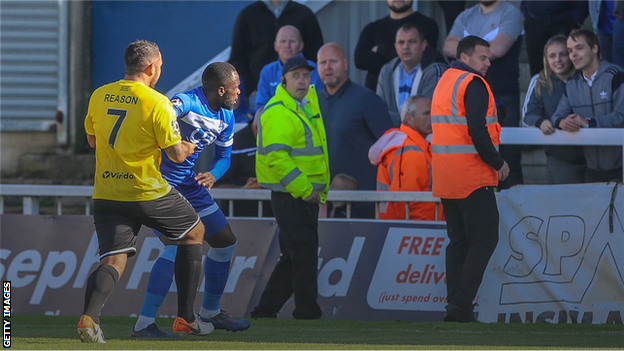
There is no suggestion any of the spectators featured in photos in this article are guilty of any wrongdoing
What you are about to read is based on eyewitness accounts of a racist incident in English football last September that go beyond the headlines.
Hosts Hartlepool were the culprits and Dover's Inih Effiong was the victim during a tempestuous National League game in which the home side finished with only nine men and had manager Craig Hignett sent off.
Pools were charged by the Football Association and eventually found guilty of failing to ensure their fans refrained from using racially abusive language. They were fined £7,500, with £5,000 suspended for 18 months.
Hartlepool banned two individuals, although the FA has said "on the balance of probability there was possibly a third" person involved. Since the interviews, further allegations of racist abuse in a match in early March between Hartlepool and Ebbsfleet are being investigated by the FA.
That Saturday in September might for some be just another statistic. One more incident that is counted and condemned before football carries on, with racism in the UK game growing at an alarming rate.
But for those affected, what happened has lingered far longer in the memory. And its damaging consequences reach further than you might think.

Victoria Park is less than a half a mile's walk from Hartlepool train station; past the chain restaurants hugging the dual carriageway and a few metres from the large Morrisons. It has stood at the Clarence Road site - in one form or another - since 1886, first as a home to West Hartlepool Rugby Club and from 1908 as the base for Hartlepool United.
The condition of this near 8,000-capacity ground is as you would expect for a club that has journeyed around the lower leagues for most of its history. If Victoria Park was a watch, it would be vintage, but in need of servicing.
Chief executive Mark Maguire's office is one of a handful you find as you enter the club, PVC door and all, and past reception. An estate agent might describe it as 'having the feel of portable cabins'. There's a TV on the wall, a whiteboard, a desk and little else.
After making a round of teas for the staff, the club's chief executive sat down to discuss the events of 21 September 2019.
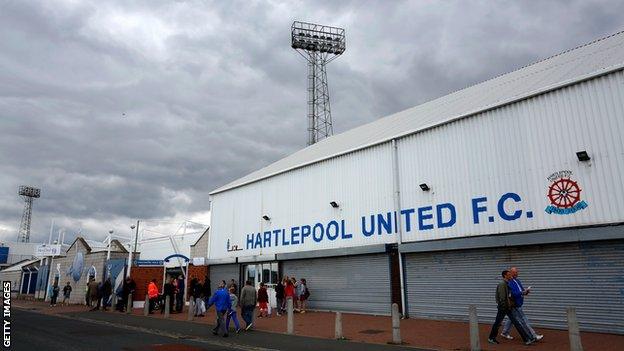
Hartlepool's Victoria Park ground is also known as the Super 6 Stadium
Maguire remembers a "growing exasperation, anger and frustration" among the crowd, with referee Joe Johnson a target of some animosity.
Maguire says he was already "aware of the referee", who sent off three players in a match in 2016 involving Witton Albion and Chester, where he was chief executive at the time. When four players were booked inside the first 30 minutes at Victoria Park, he was concerned.
"I took the really unusual step, which I'd never before done in my career, of going down to the bench," Maguire says.
"I told our goalkeeping coach, 'just be careful, because if this carries on this guy will send people off'. Then the penalty was awarded which was considered to be controversial in the moment..."
That came in the 36th minute when Dover striker Effiong was fouled. He took the spot-kick himself, placing the ball high past the goalkeeper. He ran towards the home fans standing on the Town End Terrace, and celebrated by putting his finger to his lips.
He then celebrated near the corner flag with his team-mates before breaking off and cupping his hand to his ear - that is when he was racially abused. Effiong, his Dover team-mates and Hartlepool's Gus Mafuta were among those who then approached the fans behind the goal.
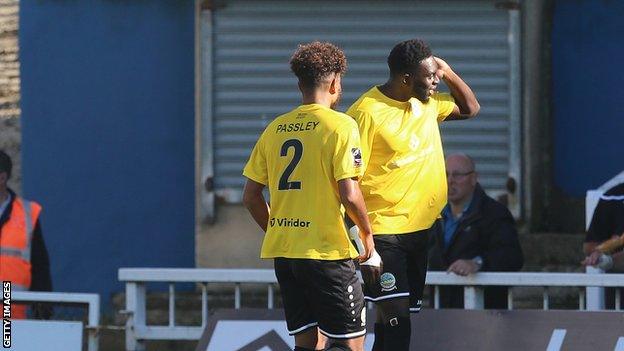
Effiong celebrates putting Dover into the lead
"It's safe to say there was over-celebration," says Maguire. "That shouldn't lead to racial abuse. But on the other hand there's a school of thought… our job as a club is to take the preventative measures we can and take the educational measures to make it clear that sort of behaviour is unacceptable.
"When you look at the instances of abuse that have occurred it seems to be a cumulative set of events that lead to it... before some ignorant, bigoted so-and-so oversteps the mark.
"If the referee's display had been better would there have been that issue? Possibly, possibly not. If the Dover players hadn't celebrated in the way they did, would it have happened? Possibly, possibly not.
"If the ref had ushered them away then it certainly would have avoided that point of confrontation. But that in no way allows for people's behaviour the way it was."
During BBC Three's documentary Shame in the Game, Effiong spoke about the moment he was abused and his disappointment with how referee Johnson dealt with the situation.
"If it happened and there was a black referee there, he would just walk everyone off the pitch," he said. "White referees don't understand."
Johnson also booked Effiong for celebrating in front of the Hartlepool fans, a decision upheld by the FA.
"I'd cupped my ear to them, as if to say, yeah, there you go," Effiong said. "That's when, obviously, the racist abuse started happening.
"The ref was saying that I sparked it all off with my celebration. As a ref, you shouldn't really be saying... it's sort of saying that, because I did a celebration, I should now be receiving racial abuse."
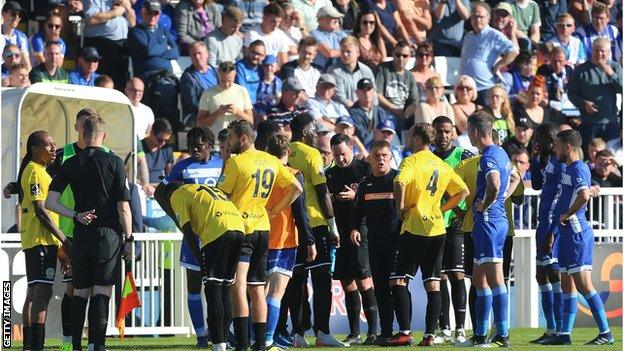
Then Hartlepool boss Hignett says he deeply regrets not leading his players off the pitch
There followed a 10-minute period when the game was stopped as officials and staff from both teams tried to work out what to do.
"I was aware there was something more serious going on," continues Maguire.
"I was loosely in contact with the control room, and it was suggested there had been some racist abuse. It didn't seem like anybody was taking control on the pitch; we were unsure as to the protocol [Fifa had sent a letter to member associations in July with details of the three-step protocol in response to racist abuse].
"I went down to pitchside. The main people upset were Gus, Effiong, plus Ricky Modeste from our side. I apologised to them, and said we'd deal with it. I think it played a part in getting on with the game."
Maguire spoke to Dover chiefs at the break and discussed with Hartlepool chairman Raj Singh the need to put out a message over the Tannoy: "Hartlepool United condemn racist, bigoted behaviour of any description. We value your loyal and passionate support but we implore you to do it in the right way."
At the subsequent FA hearing, the statement was considered not condemnatory enough.
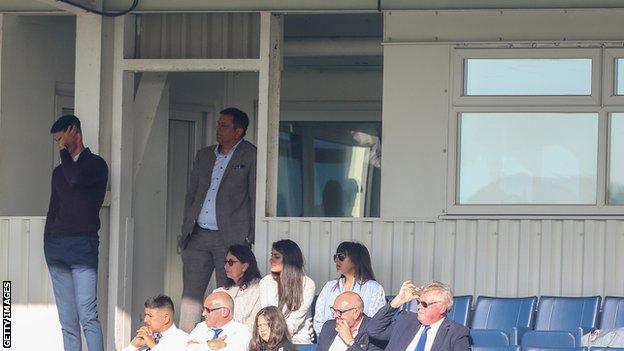
Hartlepool chairman Singh watches on from a doorway in the stands
The second half descended into chaos as Johnson sent off Hartlepool's Ryan Donaldson for dissent and then manager Hignett for criticising the officials. Substitute Nicky Featherstone became the third Pools dismissal when he was shown red for dissent after Steven Rigg made it 2-0 to Dover six minutes from time. A fan also invaded the pitch.
Maguire says he took a mantra of "action rather than words". He returned to work on Sunday and spoke to Kick It Out and Show Racism The Red Card to get advice on how to deal with racist abuse. Singh, formerly the chairman and owner of local rivals Darlington, visited Hartlepool's black players to assure them that the club would be putting a plan in place.
There had been a suggestion defender Peter Kioso, now at Luton, was too upset to play in the next fixture against Chesterfield. The match programme for that game contained midfielder Mafuta's thoughts on the incident. "Everything about that day was wrong," he told the Hartlepool Mail., external
Maguire previously worked in the hospitality industry, before taking up administration roles at his boyhood club Stockport County. He moved to Hull City, Chester and then Hartlepool in May 2018, shortly after Singh bought the club and saved it from going into liquidation. In early June, after the interview for this article, he left the club by mutual consent.
He says he has had some tough days at Pools, but that Saturday was one of the worst.
"It made me feel sick, the whole thing made me feel sick."

Understandably, Effiong did not wish to revisit the incident when approached for this article. But he told BBC Three he considered quitting football because of it.
"At that time, you're so disheartened," he said. "You've worked hard all your life to get racially abused."
Referee Johnson is contrite about what he said to Effiong. "It was a bad choice of words," he says. He wishes he could change that entire day.
It was difficult to get Johnson to open up for this article. There was an initial conversation, followed by silence and then more messages before he decided he was in the right frame of mind to talk.
He officiated "two or three" matches after the Hartlepool-Dover encounter during which he realised his mind was somewhere else. Criticism of his display at Victoria Park - both explicit and suggested - continued to circulate in his head and, as a consequence, he had a breakdown and took time off with stress.
The Professional Game Match Officials Board (PGMOL), the body responsible for match officials in the English game, has been supportive. It has sports psychologists, Liam Slack and Paul Russell, available to assist at times of need and Johnson says, "if it wasn't for them I don't know where I would have been".
But it took him a week to make that first call for help.
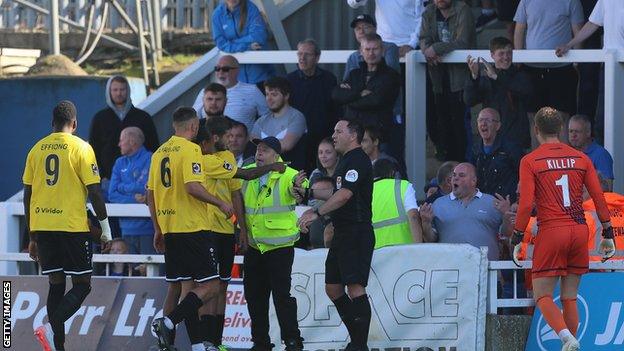
There is no suggestion any of the spectators featured in photos in this article are guilty of any wrongdoing
"I've struggled with trying to understand what happened... and understand if it was my fault," says Johnson, who also helps manage a car-service garage in Bootle.
Aside from admitting he missed what should have been a second-half penalty for Hartlepool, which culminated in Hignett's dismissal, he thought he got decisions correct, including the first-half penalty. But what about the flashpoint between the fans and players?
"I got caught in the middle trying to calm the players down," he says. "I'm stood between them and the spectators and realised I was blocked in by the barriers - it was a dangerous position so I got out of the way. I physically could not push any more players back. You can't manage the unmanageable."
Johnson says he was aware of the protocol for incidents of racism because they were relayed to officials during a summer seminar held by the PGMOL - so he stopped the game. However, he wishes he had not restarted it.
"I didn't want to be the first ref to abandon a match for racism," he says. "The focus would have been on me. The managers and players decided upon themselves to resume so that got me out of the dilemma, but if I was more confident I would have called it off."
The end of the match couldn't come soon enough for Johnson.
"After full-time I exchanged notes with the FA's match observer - it's something that usually takes 20 minutes, but it went on for an hour that day," he adds.
"I was then escorted from the changing room to the car park and recall some fans being abusive towards me. I can't remember the drive home - I put my phone on silent. When I got back I told my partner that I didn't want to speak about it.
"On the Sunday morning I filed the match report to the FA and was in a daze producing it. I didn't go to work at the garage on the Monday and took a sleeping pill that night. The whole thing hit me the following day and I didn't go to work for the rest of that week."
Football's shutdown has given Johnson further time to think about whether he can return to the role which consumed much of his adult life.
"Refereeing cost me my first marriage because I was committed to it," he says. "I missed kids' birthdays because I spent so much time away. I want to come back because my heart tells me to, but could I referee a game tomorrow? Definitely not.
"I don't know if I ever can again."

Regret. He felt it then and feels it now.
Hignett spent nine of his 21 playing years in the north east of England - six of those at Middlesbrough, only 15 miles down the road from Hartlepool. His love of the region's people, the clubs he played for and the one he managed means September's incident has festered in his mind. He says it contributed to him losing his job.
"I didn't want to believe it straight away," he says of what unfolded before him.
"Once play was halted I walked on the pitch to speak to Dover boss Andy Hessenthaler about what we should do. In hindsight I would have taken my players off had I understood how much that incident actually affected them."
Hignett says he spoke to Mafuta, Kioso and forward Nicke Kabamba, wanting to make sure they were in the right frame of mind to continue.
"Gus said he was OK, but I wish I'd taken them all off. They weren't directly abused - but they were there, they saw it and they heard it. I wish I'd walked off," he says.
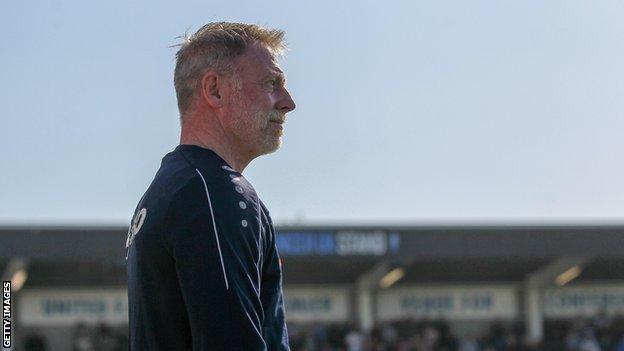
Hignett made over 150 league appearances for Middlesbrough as a player, between 1992-1998
"It's the one thing I regret about that day. That would have forced the FA and other bodies to do something more urgent."
For Hignett personally, matters were going to take another undesirable and significant twist when he was sent off, which resulted in a charge of two counts of misconduct.
"I had to go to an FA hearing and ended up getting a two-game ban," he continues. "I served one at Stockport and then I got sacked.
"We only had lost three in 12 and were four points from a play-off spot. The club haven't told me the real reason I was dismissed. They said we didn't have enough points and weren't happy with the way we were going. That was a hard one to accept.
"That racist incident knocked my head in for a good while. You feel responsible. To be at the game and see it happen... it makes you sick to the core. We worked so hard to get the club on a level footing. We were looking forward to next season. Something like that sets you back to square one."

"The car parking used to be free here," says Richard Ward as he pulls up at Navigation Point in Hartlepool Marina. "They don't come here like they once did. It was busy in the evenings, but people go elsewhere now."
It is faded glamour in this part of town. The boats and small yachts remain docked in the Tees Valley waters, in front of a small parade of independent cafes and restaurants.
Ward, 40, who works as a scientist and is chairman of Hartlepool's supporters' trust, was born in the town but now lives in nearby Stockton. He's been following the club since the early 1990s. He joined his dad, who was a season-ticket holder, and his older brother in watching the likes of Nicky Southall, Keith Houchen, Mick Tait and Joe Allon.
Pools have since flitted between the third and fourth tiers of English football but were a whisker away from reaching the Championship in 2005. That was as good as it got and in 2017, after 89 years in the Football League, Hartlepool were relegated to the National League. The drop placed the club in financial peril - it was only thanks to Singh and Pools president Jeff Stelling that they avoided liquidation in early 2018.
Ward was in the stands, close to the pitch, when the drama of that Saturday in September unfolded.
"I was 20 metres away and thought it was a soft penalty," he says of the foul on Effiong.
"When the lad came back to celebrate in front of the fans I saw a group of 20 or so pushed forward, effing and blinding. We then realised a couple had crossed the line. In the end those abusers were shepherded out by our own fans."
Ward says the home fans continued to boo Effiong, but was adamant there was no more racism after the match restarted.
"You think of a pantomime villain - if you're going to give something in front of the home crowd then expect something back. I was booing him. You can put that on the record."
After the game Ward said he was left feeling "anger, shame and embarrassment", but what also troubled him was the thought of repercussions for his club.
"The last thing we need is a fine or a points deduction," he says. "We are desperately trying to get out of this league. 'Mr Singh is going to be pretty upset about this - for more than one reason', I thought.
"You can't think of the right words… these people who abuse don't stop to think before they do it."
Ward was encouraged by the way both Hignett and the club responded swiftly with their anti-racism stances, and says the atmosphere in the following games was more subdued among supporters.
"In the following fixture against Chesterfield we distributed some small anti-racism cards. In the main people were very supportive, but not everybody took one because their argument was, 'I'm not a racist, so I don't need to hold one'.
"But I was pleased with how fans responded to the abusers on the day. We rely on supporters coming through that door and sponsors paying the bills. I don't want to go to a ground where racism goes on and where people think that's acceptable. It's important for society, but it's important for our club so that we can attract a wider fanbase."
Ward said HUST, the supporters' trust, was looking to work with the club on anti-racism projects, and hold workshops with different community groups to present Pools as more "welcoming to a larger, diverse set of people".
As the interview ended, Ward continued to talk passionately about his club's predicament before catching the eye of a familiar face who then came over.
After exchanging pleasantries, the friend enquired what our conversation was about. When Effiong was mentioned, he responded, "Well, he instigated it didn't he?" before walking off.
Ward's head slumped. "After all that, eh?"